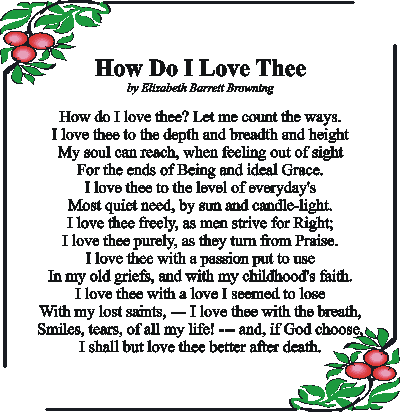Critical Analysis of If Thou Must Love Me:
“If Thou Must Love Me” is an atypical sonnet in many ways. This is because of all its differences from the sonnets written during the period of the Renaissance. In those sonnets, the speaker was always a man. Since this sonnet is written by the poet in her own persona, the speaker here is, in fact, a woman. Moreover, in Petrarchan sonnets, the object of desire of the speaker was a highborn woman who would always be unattainable. Even in Shakespearean sonnets, the object of desire (whether the Fair Man or the Dark Lady) had a much-disputed identity. However, in Barrett Browning’s sonnet, there is no difference in class or status between subject and object. The object of desire is also not in any way unattainable, the subject and object are already in an intimate relationship in fact, and the object’s identity is known for certain, without a shadow of a doubt. It is clear from the very start that Barrett Browning is writing her sonnets for her husband. In Petrarchan sonnets, the mistress was praised to no end, and comparisons were made with all kinds of beautiful objects in nature. This kind of hyperbolical praise of the beloved was already critiqued by Shakespeare in his work. This is most evident in Sonnet 130 (“My mistress’ eyes are nothing like the sun”), where Shakespeare asserts that his mistress is not perfect, but that he loves her all the same. Barrett Browning takes it a step further. She does not attempt to describe her beloved at all, and more importantly, she tells her beloved not to be taken in by her physical appearance, her mind, or her manners. Instead, the poet upholds the sanctity of a non-living thing and an abstract concept – love. It is love which is king in her sonnet, not she or her beloved for that matter. In all these ways, her sonnet is both novel and unique.
Annotation of If Thou Must Love Me:
Please note: N= noun, V=verb, Adj=Adjective, Adv=Adverb, P=Preposition, Pr=Pronoun, Ph V=Phrasal Verb
Thou (Pr): An older form of the word “you”
Nought (N): Nothing
Sake (N): For the purpose of; in the interest of; in order to achieve or preserve
Trick (N): A peculiar or characteristic habit or mannerism
Fall in with (Ph V): To agree with or be in harmony with
Certes (Adv): Assuredly; I assure you
Sense (N): A feeling that something is the case
Pleasant (Adj): (Of a person or their manner) friendly and considerate; likable
Ease (N): Absence of difficulty or effort
Beloved (N): A much-loved person
Thee (Pr): An older form of the word “you”
Wrought (Adj): Made or fashioned in a specified way
Thine (Pr): An older form of the word “yours”
Dear (Adj): Endearing; sweet
Pity (N): The feeling of sorrow and compassion caused by the sufferings and misfortunes of others
Wiping (V): Present participle form of the word “wipe”, that is, to clean or dry (something) by rubbing with a cloth, a piece of paper, or one’s hand
Bore (V): Past tense of the word “bear”, that is, to have or display as a visible mark or feature
Thy (Pr): An older form of the word “your”
Comfort (N): The easing or alleviation of a person’s feelings of grief or distress
Thereby (Adv): By that means; as a result of that
Evermore (Adv): Always
Mayst (V): An older form of the word “may”
Eternity (N): Infinite or unending time
Poetic Devices in If Thou Must Love Me:
Rhyme scheme:
Sonnets typically occur in two types of rhyme schemes – in the pattern ABBA ABBA CDE CDE , known as the Petrarchan sonnet, or in the pattern ABAB CDCD EFEF GG, known as the Shakespearian sonnet. In this poem, neither of these patterns is followed in its entirety. Its rhyme scheme is as follows: ABBA ABBA CDCDCD. Thus it is an atypical sonnet.
Rhetorical devices:
Apostrophe:
This rhetorical device is used when a poet addresses his or her poem to an absent audience. In this poem, the poet uses the device of apostrophe throughout the poem as she addresses all her words to the man she loves (her husband, Robert Browning), but whom we readers never see at any point in the poem.
Transferred epithet:
This rhetorical device is used when an emotion is attributed to a non-living thing after being displaced from a person, most often the poet himself or herself. In this poem, the poet uses the device of transferred epithet in line 10 when she writes the phrase “dear pity”. It is not that pity is equivalent to sweetness, but that his pity brings sweetness to the character of the man the poet loves.
Central Idea of If Thou Must Love Me:
The poet tells her beloved to love her only for the sake of love, and not for anything else – not for her smile, or her looks, not for the way she speaks or the way she thinks, and also not out of pity for her. Only if he loves her for the sake of love will their relationship last for all eternity.
Themes of If Thou Must Love Me:
Temporary love VS permanent love: For Barrett Browning, love can be of two types – one that lasts a little time, and one that lasts for all eternity. The love that is temporary is based on the particular – the particular way in which a person smiles, the particular look of a person, the particular way in which he or she thinks, et cetera. This kind of love is trivial in comparison to the other kind. The other kind is based on the universal – the universal emotion that we call love itself. This is an emotion that anyone is capable of experiencing, and hence, it is this which should give birth to the relationship between two people, and nurture that relationship as well. These ideas of Barrett Browning’s may have been derived from Plato, for Plato also speaks of moving from the particular to the general (by way of what is known as the Platonic Ladder) in matters of love in his work entitled Symposium.
Autobiographical element: In the Victorian age, we do not find confessional poetry per se, since that genre was strictly discovered in the Modernist period. However, we do notice some autobiographical elements in Victorian poetry nonetheless. Perhaps this is a legacy of the Romantic movement, that focused on the poet’s individualism and interiority. Barrett Browning, too, includes a part of her own story in each sonnet of the collection entitled Sonnets from the Portuguese, from which “If Thou Must Love Me” is taken. This sonnet is no exception. As we have mentioned before, she suffered from multiple severe physical ailments throughout her lifetime. As a result, she felt it was unnatural for any man to love such a physically ill woman like herself. That is why she expected that all men loved her simply out of pity. When she first met and began to be courted by Robert Browning, she suspected that his love was also born out of his pity for her. That is why, in this sonnet, she tells her beloved not to love her because he has devoted much time to wipe the tears from her cheeks. His love has made her happy, and she may forget to weep, and if that happens, he will neither pity her nor love her any longer. Of this, she is afraid. Instead, she suggests that he should love her only for the sake of love.
The tone of If Thou Must Love Me:
The tone of this poem is rather ambiguous. In the beginning, she seems to be spurning any praise that might be directed towards her by her beloved, and we are left wondering why she would want to do so. Next, she tells him that she might change, and this sounds like an ominous warning. However, in the end, when she affirms the primacy of love as the reason their relationship will last a lifetime, the sincerity of her emotions shines through and dispels all our doubts about her intention in writing this sonnet. We are assured that she means to strengthen her relationship with her husband, and that is a satisfying feeling indeed.
Conclusion:
“If Thou Must Love Me” is an atypical sonnet in terms of both form and content. However, it is also one of the best sonnets ever written in the English language. That is why it is read as widely today as it was in Barrett Browning’s lifetime.
Some online learning platforms provide certifications, while others are designed to simply grow your skills in your personal and professional life. Including Masterclass and Coursera, here are our recommendations for the best online learning platforms you can sign up for today.
The 7 Best Online Learning Platforms of 2022
- Best Overall: Coursera
- Best for Niche Topics: Udemy
- Best for Creative Fields: Skillshare
- Best for Celebrity Lessons: MasterClass
- Best for STEM: EdX
- Best for Career Building: Udacity
- Best for Data Learning: Pluralsight
















